Burt A. The Evolution of the British Empire and Commonwealth From the American Revolution
Подождите немного. Документ загружается.

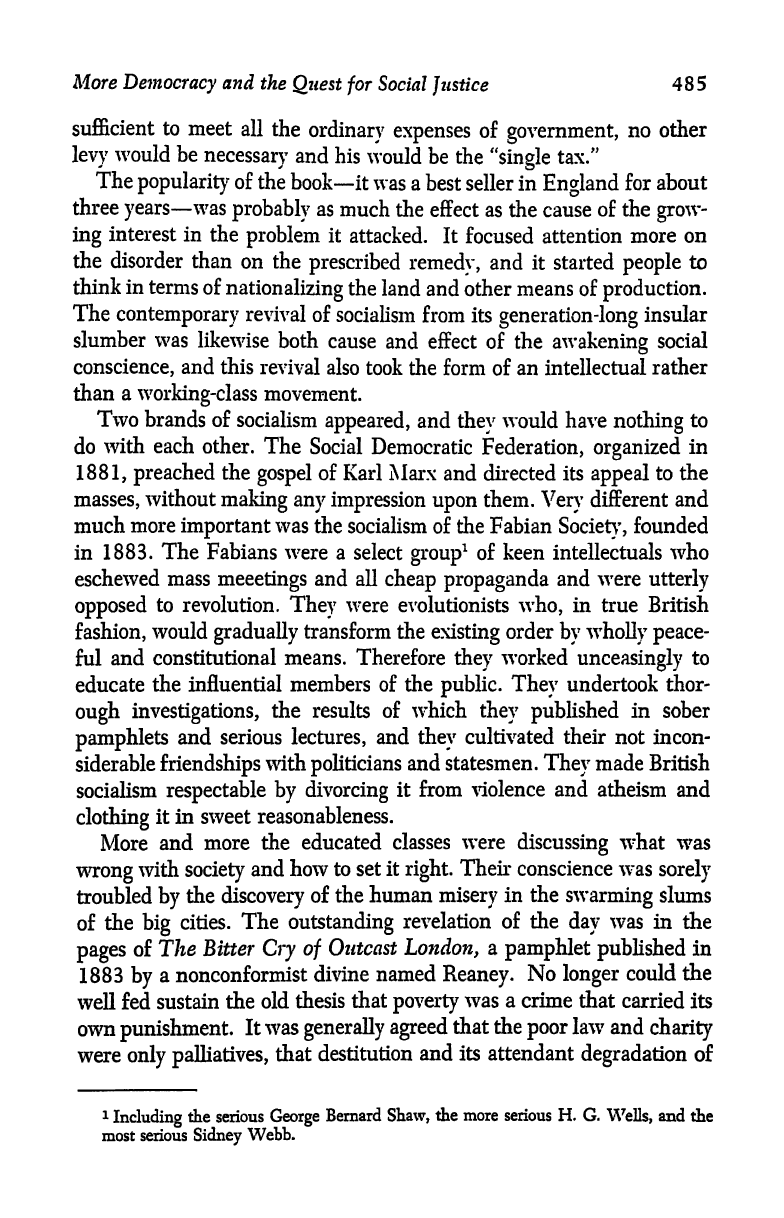
More
Democracy
and
the
Quest
for
Social
Justice
485
sufficient
to meet
all
the
ordinary expenses
of
government,
no
other
levy
would
be
necessary
and
his
\vould be
the
"single
tax."
The
popularity
of
the
book
it
was
a
best seller in
England
for
about
three
years
was
probably
as
much
the
effect as the cause
of the
grow-
ing
interest in
the
problem
it
attacked.
It
focused
attention
more on
the disorder
than
on the
prescribed
remedy,
and
it
started
people
to
think
in
terms of
nationalizing
the
land and other
means
of
production.
The
contemporary
revival of
socialism from its
generation-long
insular
slumber
was
likewise
both
cause
and
effect of
the
awakening
social
conscience,
and this
revival also
took the form
of
an intellectual
rather
than
a
working-class
movement.
Two
brands
of
socialism
appeared,
and
they
would
have
nothing
to
do
with each
other.
The
Social
Democratic
Federation,
organized
in
1881,
preached
the
gospel
of
Karl
Marx
and directed its
appeal
to
the
masses,
without
making any impression upon
them.
Very
different
and
much
more
important
was
the socialism
of
the Fabian
Society,
founded
in 1883.
The
Fabians were a
select
group
1
of
keen intellectuals
who
eschewed
mass
meeetings
and all
cheap
propaganda
and were
utterly
opposed
to revolution.
They
were
evolutionists
who,
in true British
fashion,
would
gradually
transform the
existing
order
by wholly peace-
ful
and constitutional
means.
Therefore
they
worked
unceasingly
to
educate
the influential members of the
public. They
undertook thor-
ough
investigations,
the
results
of
which
they
published
in sober
pamphlets
and serious
lectures,
and
they
cultivated
their
not incon-
siderable
friendships
with
politicians
and
statesmen.
They
made
British
socialism
respectable
by
divorcing
it from
violence
and atheism
and
clothing
it in sweet
reasonableness.
More
and
more the
educated
classes
were
discussing
what
was
wrong
with
society
and how
to set
it
right.
Their conscience
was
sorely
troubled
by
the
discovery
of
the human
misery
in the
swarming
slums
of
the
big
cities.
The
outstanding
revelation
of
the
day
was in the
pages
of The
Bitter
Cry
of
Outcast
London,
a
pamphlet
published
in
1883
by
a nonconformist
divine
named
Reaney.
No
longer
could
the
well
fed
sustain
the old
thesis
that
poverty
was
a
crime that
carried
its
own
punishment.
It
was
generally
agreed
that the
poor
law
7
and
charity
were
only
palliatives,
that
destitution
and its attendant
degradation
of
1
Including
the
serious
George
Bernard
Shaw,
the more serious H. G.
Wells,
and
the
most
serious
Sidney
Wehh.
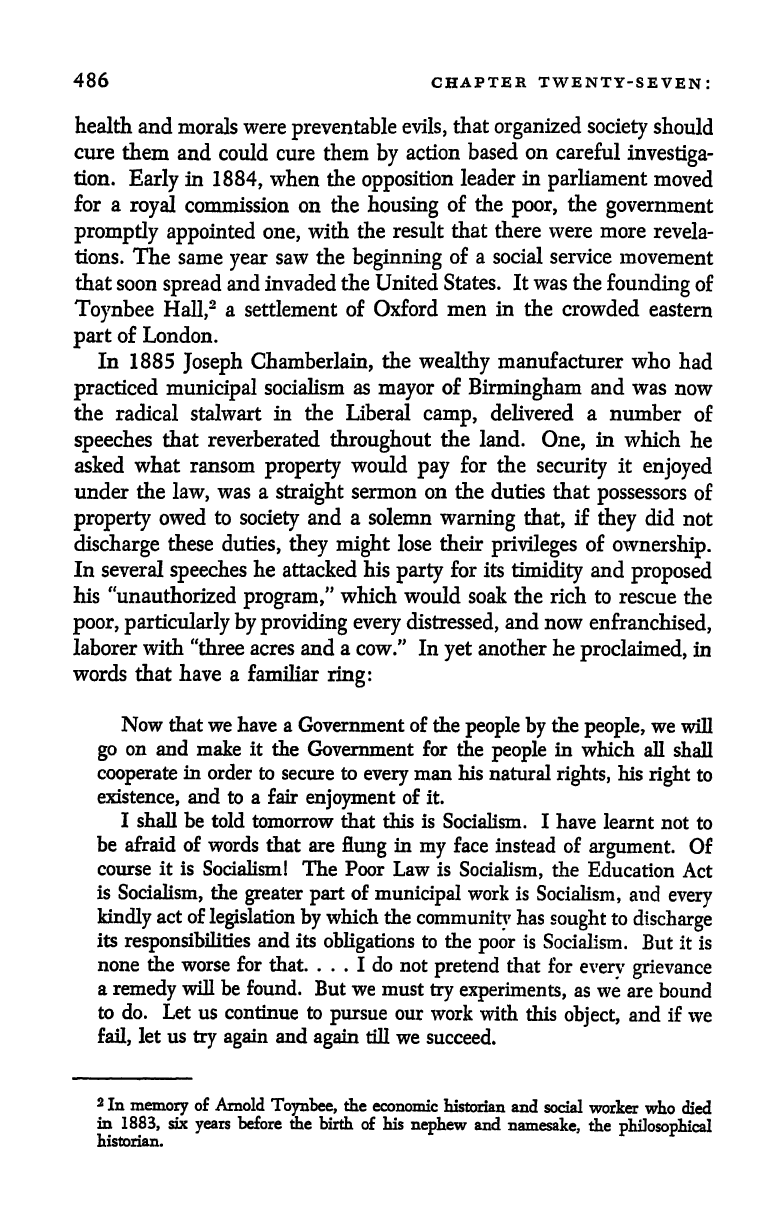
486
CHAPTER
TWENTY-SEVEN:
health
and
morals
were
preventable
evils,
that
organized
society
should
cure
them
and
could cure
them
by
action
based
on
careful
investiga-
tion.
Early
in
1884,
when
the
opposition
leader
in
parliament
moved
for a
royal
commission on the
housing
of
the
poor,
the
government
promptly
appointed
one,
with
the
result
that there were
more
revela-
tions.
The
same
year
saw the
beginning
of
a
social
service
movement
that
soon
spread
and invaded
the
United
States. It was
the
founding
of
Toynbee
Hall,
2
a settlement
of Oxford
men
in
the
crowded
eastern
part
of London.
In
1885
Joseph
Chamberlain,
the
wealthy
manufacturer
who
had
practiced
municipal
socialism
as
mayor
of
Birmingham
and
was
now
the
radical
stalwart
in
the
Liberal
camp,
delivered
a
number
of
speeches
that
reverberated
throughout
the land.
One,
in
which
he
asked
what
ransom
property
would
pay
for the
security
it
enjoyed
under
the
law,
was a
straight
sermon on the
duties
that
possessors
of
property
owed to
society
and
a
solemn
warning
that,
if
they
did
not
discharge
these
duties,
they
might
lose their
privileges
of
ownership.
In several
speeches
he attacked his
party
for its
timidity
and
proposed
his "unauthorized
program,"
which
would soak
the
rich
to
rescue
the
poor,
particularly
by
providing
every
distressed,
and
now
enfranchised,
laborer
with
"three
acres
and
a
cow/' In
yet
another
he
proclaimed,
in
words that have a familiar
ring:
Now that
we have a
Government of
the
people
by
the
people,
we
will
go
on and
make it
the Government for
the
people
in
which
all
shall
cooperate
in
order to
secure
to
every
man his
natural
rights,
his
right
to
existence,
and
to
a fair
enjoyment
of
it.
I
shall be told
tomorrow
that
this is
Socialism. I
have
learnt
not
to
be
afraid
of
words
that
are
flung
in
my
face instead
of
argument.
Of
course
it is
Socialism!
The
Poor Law
is
Socialism,
the
Education
Act
is
Socialism,
the
greater
part
of
municipal
work is
Socialism,
and
every
kindly
act
of
legislation
by
which
the
community
has
sought
to
discharge
its
responsibilities
and its
obligations
to
the
poor
is
Socialism.
But
it is
none
the
worse for
that. ... I do
not
pretend
that
for
every grievance
a
remedy
will
be
found.
But we
must
try
experiments,
as we
are
bound
to do. Let
us
continue
to
pursue
our
work with
this
object,
and
if
we
fail,
let us
try
again
and
again
till
we
succeed.
2
In
memory
of Arnold
Toynbee,
the
economic
historian
and
social
worker
who died
in
1883,
six
years
before
the birth
of
his
nephew
and
namesake,
the
philosophical
historian.
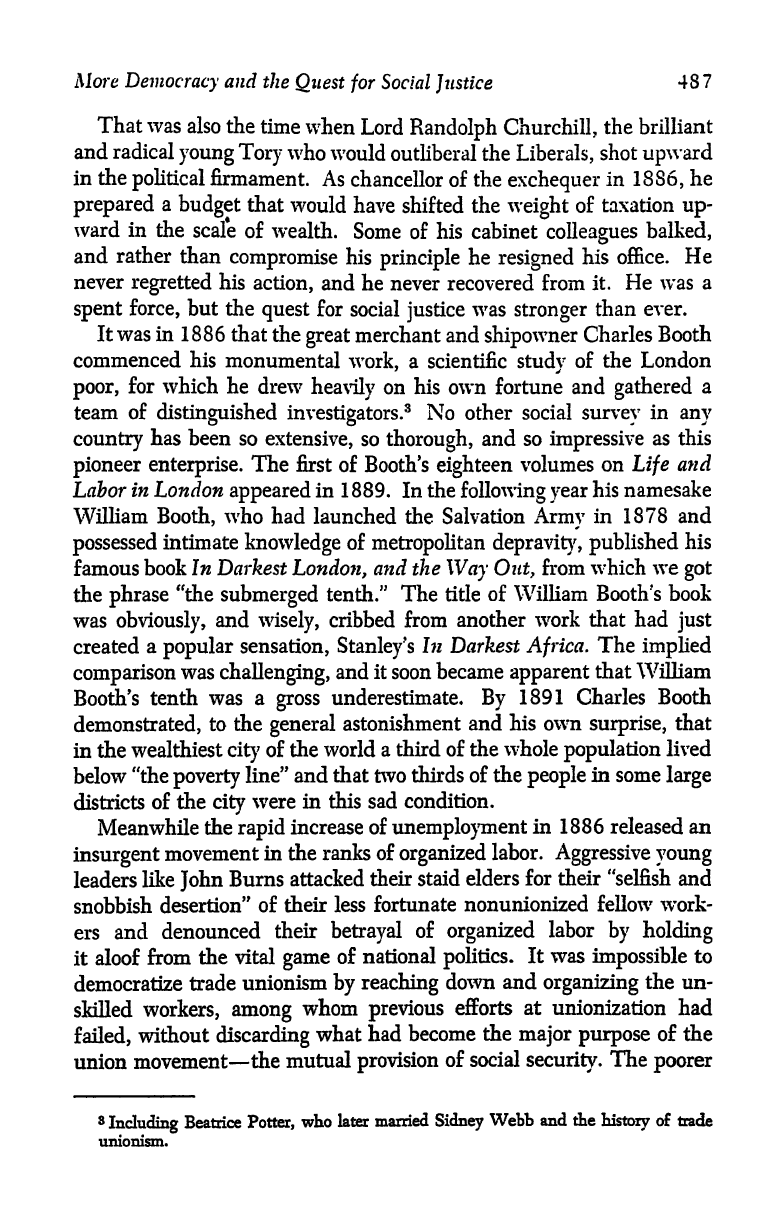
More
Democracy
and
the
Quest
for
Social
Justice
487
That was
also
the
time
when
Lord
Randolph
Churchill,
the
brilliant
and radical
young
Tory
who
would outliberal the
Liberals,
shot
upward
in
the
political
firmament.
As
chancellor of
the
exchequer
in
1886,
he
prepared
a
budget
that
would have
shifted
the
weight
of
taxation
up-
ward in
the
scal'e
of
wealth.
Some
of
his cabinet
colleagues
balked,
and
rather
than
compromise
his
principle
he
resigned
his
office.
He
never
regretted
his
action,
and he never
recovered
from
it.
He
was
a
spent
force,
but the
quest
for
social
justice
was
stronger
than
ever.
It was
in
1886 that
the
great
merchant and
shipowner
Charles
Booth
commenced his
monumental
work,
a scientific
study
of
the
London
poor,
for
which he drew
heavily
on his
own
fortune
and
gathered
a
team
of
distinguished
investigators.
3
No
other
social
survey
in
any
country
has
been
so
extensive,
so
thorough,
and
so
impressive
as this
pioneer
enterprise.
The
first of
Booth's
eighteen
volumes
on
Life
and
Labor
in
London
appeared
in 1 889.
In
the
following
year
his namesake
William
Booth,
who
had
launched the Salvation
Army
in 1878 and
possessed
intimate
knowledge
of
metropolitan
depravity,
published
his
famous
book
In Darkest
London,
and
the
Way
Out,
from which
we
got
the
phrase
"the
submerged
tenth."
The title
of
William
Booth's book
was
obviously,
and
wisely,
cribbed
from another
work that had
just
created
a
popular
sensation,
Stanley's
In Darkest
Africa.
The
implied
comparison
was
challenging,
and
it
soon
became
apparent
that
William
Booth's
tenth was
a
gross
underestimate.
By
1891
Charles
Booth
demonstrated,
to the
general
astonishment
and his
own
surprise,
that
in
the
wealthiest
city
of the world
a
third of the
whole
population
lived
below
"the
poverty
line"
and
that
two
thirds
of the
people
in
some
large
districts
of the
city
were in this sad
condition.
Meanwhile
the
rapid
increase of
unemployment
in
1886
released
an
insurgent
movement
in the
ranks of
organized
labor.
Aggressive young
leaders
like
John
Burns
attacked
their staid
elders
for
their
"selfish and
snobbish
desertion"
of their
less
fortunate
nonunionized fellow work-
ers
and
denounced
their
betrayal
of
organized
labor
by
holding
it
aloof
from
the
vital
game
of
national
politics.
It was
impossible
to
democratize
trade
unionism
by
reaching
down
and
organizing
the
un-
skilled
workers,
among
whom
previous
efforts
at
unionization
had
failed,
without
discarding
what
had
become
the
major
purpose
of the
union
movement
the
mutual
provision
of social
security.
The
poorer
3
Including
Beatrice
Potter,
who
later
married
Sidney
Webb
and the
history
of
trade
unionism.
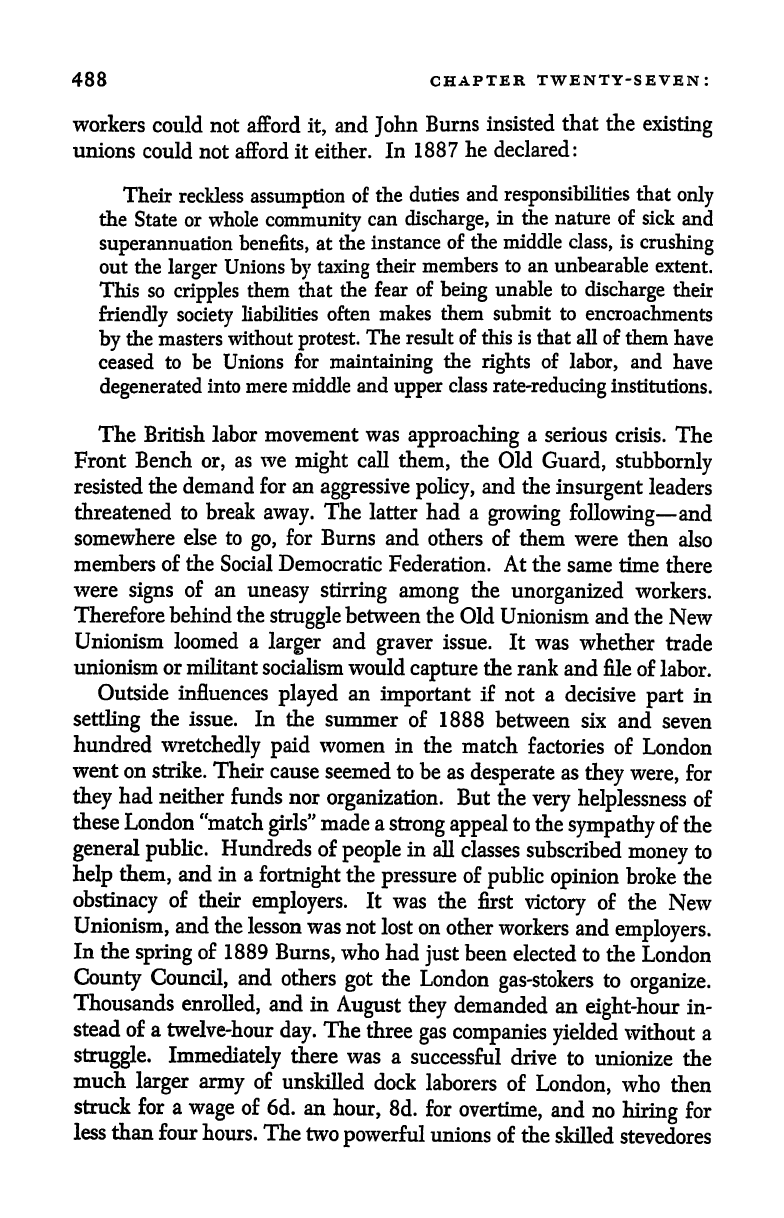
488 CHAPTER
TWENTY-SEVEN:
workers
could
not afford
it,
and
John
Burns
insisted
that the
existing
unions
could not afford it
either.
In
1887
he declared:
Their
reckless
assumption
of
the
duties
and
responsibilities
that
only
the
State or whole
community
can
discharge,
in
the nature of sick
and
superannuation
benefits,
at
the
instance
of the
middle
class,
is
crushing
out
the
larger
Unions
by
taxing
their
members to
an
unbearable
extent.
This
so
cripples
them that
the
fear
of
being
unable
to
discharge
their
friendly
society
liabilities
often
makes them submit to
encroachments
by
the masters
without
protest.
The
result of this is that all
of
them
have
ceased to be Unions
for
maintaining
the
rights
of
labor,
and
have
degenerated
into mere middle
and
upper
class
rate-reducing
institutions.
The
British labor
movement was
approaching
a
serious
crisis.
The
Front
Bench
or,
as we
might
call
them,
the
Old
Guard,
stubbornly
resisted
the demand
for an
aggressive policy,
and
the
insurgent
leaders
threatened to break
away.
The latter
had
a
growing
following
and
somewhere
else
to
go,
for
Burns and
others
of them
were
then
also
members of
the
Social Democratic
Federation.
At
the
same time
there
were
signs
of
an
uneasy
stirring
among
the
unorganized
workers.
Therefore
behind
the
struggle
between the
Old
Unionism and
the
New
Unionism loomed
a
larger
and
graver
issue.
It was
whether
trade
unionism
or militant
socialism
would
capture
the rank
and file
of
labor.
Outside influences
played
an
important
if
not a
decisive
part
in
settling
the
issue. In the
summer
of
1888
between six
and
seven
hundred
wretchedly paid
women
in the
match
factories
of
London
went
on strike. Their
cause
seemed to
be as
desperate
as
they
were,
for
they
had neither
funds
nor
organization.
But
the
very
helplessness
of
these
London
"match
girls"
made a
strong appeal
to the
sympathy
of
the
general public.
Hundreds of
people
in
all
classes
subscribed
money
to
help
them,
and
in a
fortnight
the
pressure
of
public
opinion
broke the
obstinacy
of their
employers.
It
was the
first
victory
of
the
New
Unionism,
and the
lesson
was not
lost on
other
workers
and
employers.
In the
spring
of 1889
Burns,
who
had
just
been
elected
to
the
London
County
Council,
and
others
got
the
London
gas-stokers
to
organize.
Thousands
enrolled,
and in
August
they
demanded an
eight-hour
in-
stead
of a
twelve-hour
day.
The
three
gas
companies
yielded
without
a
struggle.
Immediately
there
was a
successful
drive
to
unionize the
much
larger army
of
unskilled
dock
laborers
of
London,
who then
struck
for
a
wage
of
6d.
an
hour,
8d. for
overtime,
and no
hiring
for
less than four
hours. The
two
powerful
unions
of the
skilled
stevedores
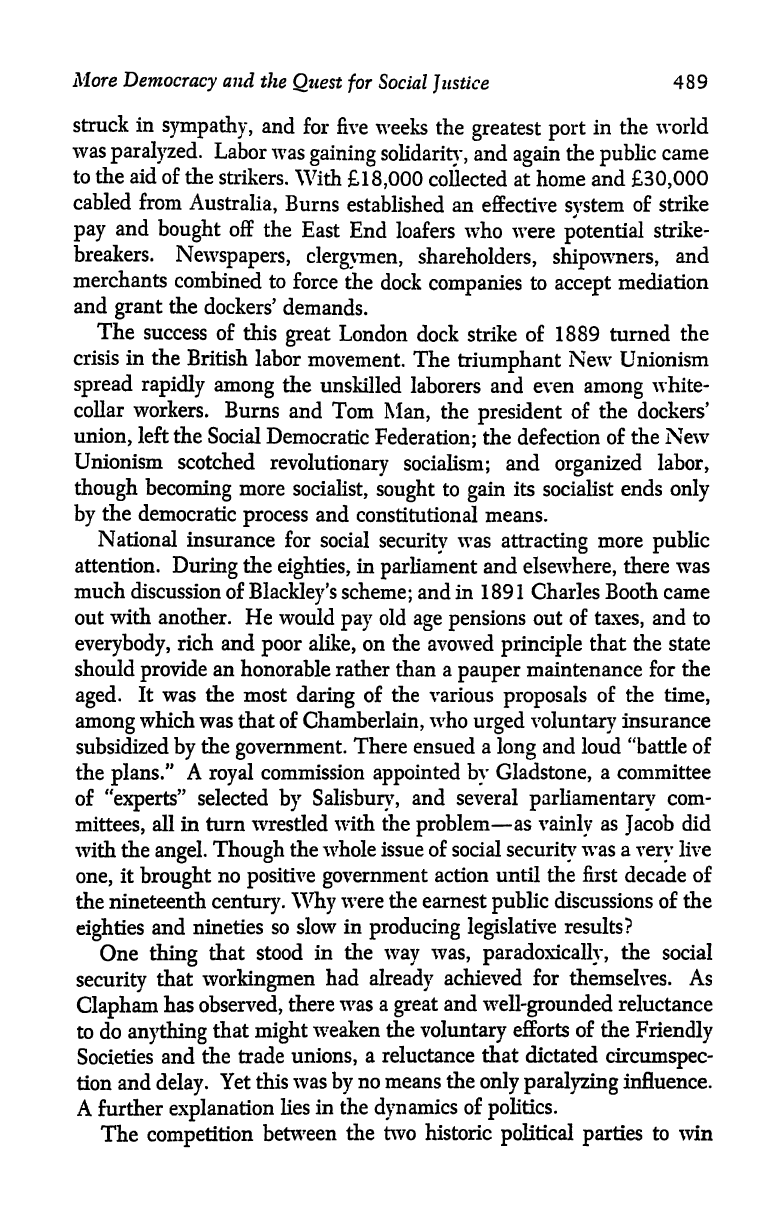
More
Democracy
and
the
Quest
for
Social
Justice
489
struck
in
sympathy,
and
for
five
weeks
the
greatest port
in the
world
was
paralyzed.
Labor
was
gaining solidarity,
and
again
the
public
came
to the aid
of
the
strikers.
With
18,000
collected
at
home and
30,000
cabled from
Australia,
Burns
established
an
effective
system
of strike
pay
and
bought
off
the
East
End
loafers
who were
potential
strike-
breakers.
Newspapers,
clergymen,
shareholders,
shipowners,
and
merchants
combined
to
force
the
dock
companies
to
accept
mediation
and
grant
the
dockers'
demands.
The
success of
this
great
London
dock
strike
of 1889
turned the
crisis
in
the
British
labor
movement.
The
triumphant
New- Unionism
spread
rapidly
among
the
unskilled laborers and
even
among
white-
collar workers.
Burns
and
Tom
Man,
the
president
of
the
dockers'
union,
left
the
Social
Democratic
Federation;
the defection
of
the
New
Unionism
scotched
revolutionary
socialism;
and
organized
labor,
though
becoming
more
socialist,
sought
to
gain
its
socialist
ends
only
by
the
democratic
process
and
constitutional
means.
National
insurance
for
social
security
was
attracting
more
public
attention.
During
the
eighties,
in
parliament
and
elsewhere,
there
was
much
discussion of
Blackley's
scheme;
and
in 1 89 1
Charles
Booth came
out
with another.
He would
pay
old
age
pensions
out
of
taxes,
and
to
everybody,
rich
and
poor
alike,
on
the
avowed
principle
that the state
should
provide
an
honorable
rather
than
a
pauper
maintenance for
the
aged.
It
was
the most
daring
of
the
various
proposals
of
the
time,
among
which was
that
of
Chamberlain,
who
urged
voluntary
insurance
subsidized
by
tie
government.
There ensued a
long
and
loud
"battle of
the
plans."
A
royal
commission
appointed by
Gladstone,
a
committee
of
"experts"
selected
by Salisbury,
and
several
parliamentary
com-
mittees,
all in turn wrestled
with
the
problem
as
vainly
as
Jacob
did
w
7
ith the
angel.
Though
the whole
issue of social
security
\vas
a
very
live
one,
it
brought
no
positive government
action
until the first decade of
the
nineteenth
century. Why
were the earnest
public
discussions
of
the
eighties
and
nineties
so slow
in
producing legislative
results?
One
thing
that stood
in
the
way
was,
paradoxically,
the
social
security
that
workingmen
had
already
achieved for
themselves. As
Clapham
has
observed,
there
was
a
great
and
well-grounded
reluctance
to do
anything
that
might
w
r
eaken
the
voluntary
efforts of
the
Friendly
Societies
and
the
trade
unions,
a
reluctance
that dictated
circumspec-
tion
and
delay.
Yet
this
was
by
no
means the
only
paralyzing
influence.
A further
explanation
lies
in the
dynamics
of
politics.
The
competition
between
the two historic
political
parties
to
win
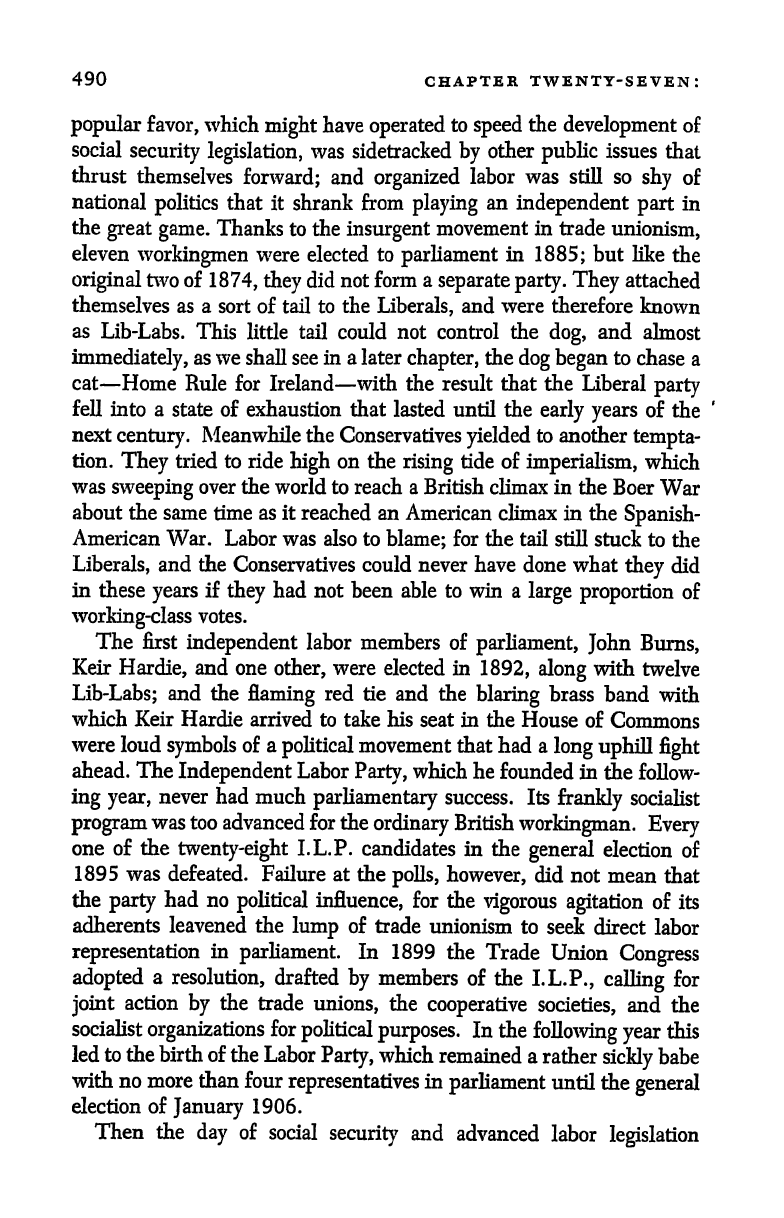
490
CHAPTER
TWENTY-SEVEN:
popular
favor,
which
might
have
operated
to
speed
the
development
of
social
security
legislation,
was sidetracked
by
other
public
issues
that
thrust
themselves
forward;
and
organized
labor
was still so
shy
of
national
politics
that
it shrank from
playing
an
independent
part
in
the
great
game.
Thanks
to the
insurgent
movement in
trade
unionism,
eleven
workingmen
were elected
to
parliament
in
1885;
but
like
the
original
two
of
1874,
they
did
not form
a
separate party.
They
attached
themselves as a
sort
of tail to
the
Liberals,
and
were
therefore
known
as
Lib-Labs. This little tail could
not
control
the
dog,
and
almost
immediately,
as
we
shall see
in
a
later
chapter,
the
dog began
to
chase
a
cat
Home
Rule for Ireland with the result that the
Liberal
party
fell
into
a
state of exhaustion that
lasted until
the
early years
of
the
next
century.
Meanwhile the
Conservatives
yielded
to another
tempta-
tion.
They
tried to ride
high
on the
rising
tide of
imperialism,
which
was
sweeping
over
the
world to reach
a
British
climax
in
the Boer
War
about
the same
time
as it
reached
an
American climax in
the
Spanish-
American
War. Labor was
also to
blame;
for the tail
still stuck
to
the
Liberals,
and the
Conservatives
could
never have
done
what
they
did
in
these
years
if
they
had not been able to win
a
large proportion
of
working-class
votes.
The first
independent
labor members of
parliament,
John
Burns,
Keir
Hardie,
and one
other,
were
elected
in
1892,
along
with
twelve
Lib-Labs;
and
the
flaming
red tie
and
the
blaring
brass band
with
which Keir
Hardie
arrived to take his
seat in the
House
of
Commons
were loud
symbols
of
a
political
movement that
had a
long
uphill
fight
ahead. The
Independent
Labor
Party,
which he
founded in
lite
follow-
ing
year,
never had much
parliamentary
success. Its
frankly
socialist
program
was too
advanced
for
the
ordinary
British
workingman.
Every
one of
the
twenty-eight
I.L.P.
candidates in the
general
election
of
1895 was
defeated. Failure at
the
polls,
however,
did not
mean that
the
party
had
no
political
influence,
for the
vigorous
agitation
of its
adherents leavened
the
lump
of
trade
unionism to
seek
direct
labor
representation
in
parliament.
In
1899
the
Trade
Union
Congress
adopted
a
resolution,
drafted
by
members of
the
I.L.P.,
calling
for
joint
action
by
the
trade
unions,
the
cooperative
societies,
and the
socialist
organizations
for
political
purposes.
In the
following
year
this
led
to the birth of
the
Labor
Party,
which
remained a
rather
sickly
babe
with no
more than
four
representatives
in
parliament
until the
general
election
of
January
1906.
Then the
day
of
social
security
and
advanced
labor
legislation
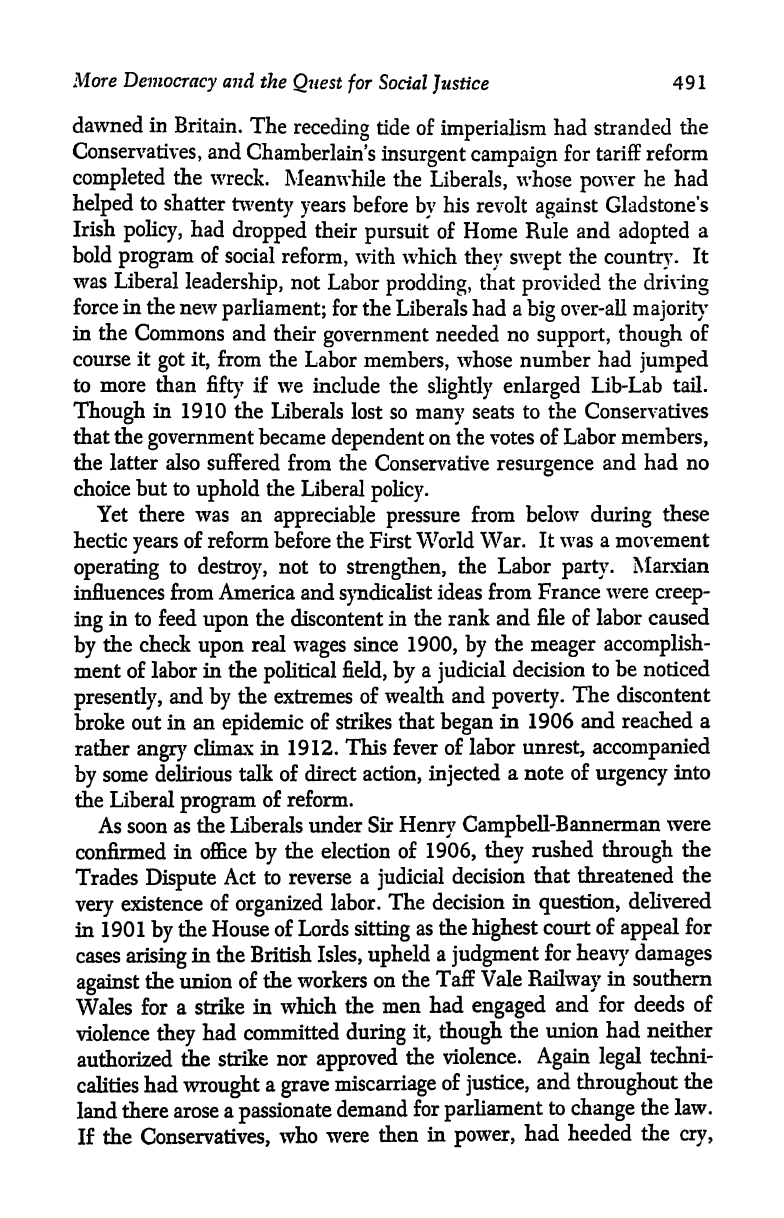
More
Democracy
and
the
Quest
for
Social
Justice
491
dawned
in
Britain.
The
receding
tide
of
imperialism
had
stranded
the
Conservatives,
and
Chamberlain
's
insurgent
campaign
for
tariff
reform
completed
the
wreck.
Meanwhile
the
Liberals,
whose
power
he
had
helped
to
shatter
twenty years
before
by
his revolt
against
Gladstone's
Irish
policy,
had
dropped
their
pursuit
of Home Rule
and
adopted
a
bold
program
of
social
reform,
with
which
they swept
the
country.
It
was
Liberal
leadership,
not
Labor
prodding,
that
provided
the
driving
force
in
the
new
parliament;
for the Liberals had a
big
over-all
majority
in
the
Commons
and their
government
needed no
support, though
of
course
it
got
it,
from the
Labor
members,
whose
number
had
jumped
to
more than
fifty
if
we
include the
slightly
enlarged
Lib-Lab
tail.
Though
in
1910
the
Liberals
lost so
many
seats
to
the
Conservatives
that
the
government
became
dependent
on
the votes of
Labor
members,
the latter also
suffered
from the
Conservative
resurgence
and
had no
choice
but
to
uphold
the
Liberal
policy.
Yet there was
an
appreciable
pressure
from below
during
these
hectic
years
of reform before the
First
World
War.
It
was
a movement
operating
to
destroy,
not to
strengthen,
the Labor
party.
Marxian
influences from
America
and
syndicalist
ideas from
France
were
creep-
ing
in to feed
upon
the discontent
in the rank
and
file
of
labor
caused
by
the check
upon
real
wages
since
1900,
by
the
meager
accomplish-
ment of
labor
in the
political
field,
by
a
judicial
decision
to be
noticed
presently,
and
by
the extremes of
wealth
and
poverty.
The discontent
broke
out in
an
epidemic
of strikes
that
began
in
1906
and reached a
rather
angry
climax in
1912.
This fever of
labor
unrest,
accompanied
by
some
delirious
talk of direct
action,
injected
a
note
of
urgency
into
the Liberal
program
of
reform.
As
soon as the
Liberals
under Sir
Henry
Campbell-Bannennan
were
confirmed
in office
by
the election of
1906,
they
rushed
through
the
Trades
Dispute
Act to reverse
a
judicial
decision
that
threatened
the
very
existence
of
organized
labor.
The decision
in
question,
delivered
in 1901
by
the
House
of Lords
sitting
as the
highest
court
of
appeal
for
cases
arising
in
the British
Isles,
upheld
a
judgment
for
heavy damages
against
the
union
of
the
workers
on
the
Taff
Vale
Railway
in southern
Wales for
a strike
in
which
the
men
had
engaged
and for
deeds
of
violence
they
had
committed
during
it,
though
the
union
had neither
authorized
die strike
nor
approved
the
violence.
Again legal
techni-
calities
had
wrought
a
grave
miscarriage
of
justice,
and
throughout
the
land
there
arose
a
passionate
demand
for
parliament
to
change
the
law.
If
the
Conservatives,
who
were
then
in
power,
had
heeded
the
cry,
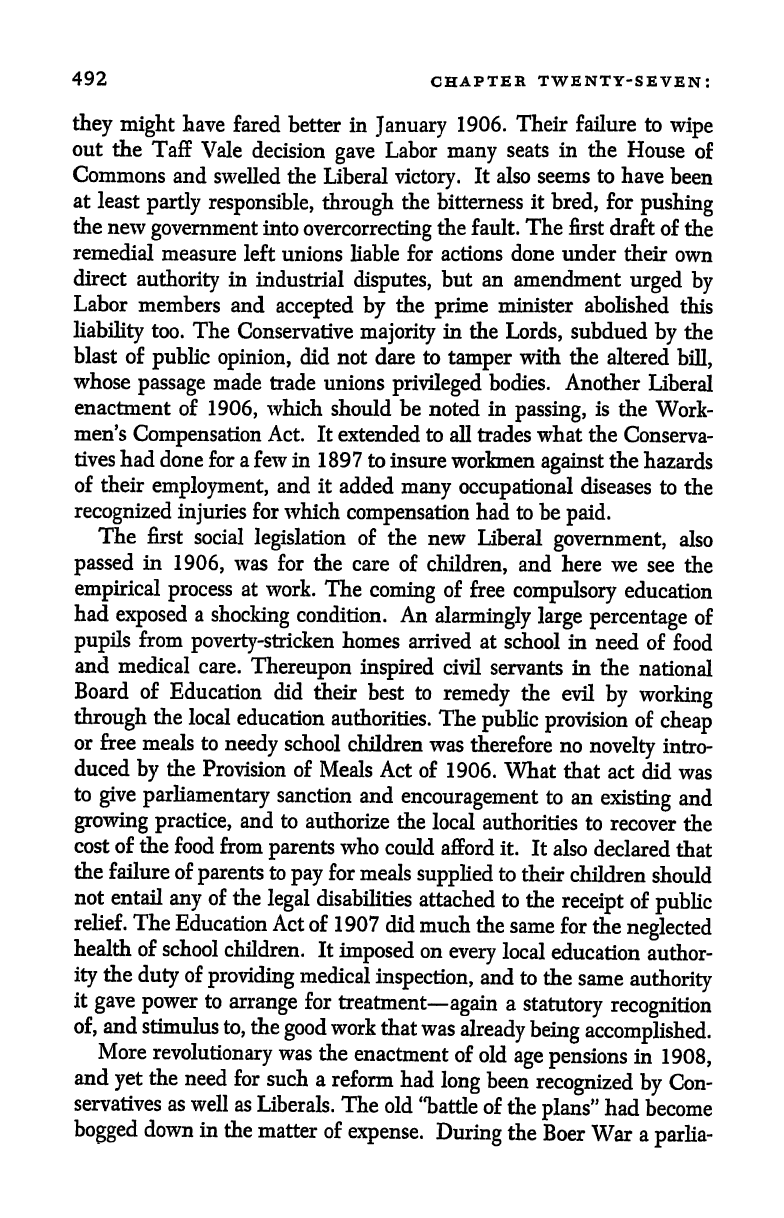
492
CHAPTER
TWENTY-SEVEN:
they
might
have
fared
better
in
January
1906.
Their failure
to
wipe
out
the
Taff
Vale
decision
gave
Labor
many
seats
in
the
House
of
Commons
and
swelled
the
Liberal
victory.
It also seems to
have
been
at
least
partly
responsible,
through
the bitterness
it
bred,
for
pushing
the
new
government
into
overcorrecting
the
fault.
The
first draft
of
the
remedial
measure
left unions liable
for actions
done under
their
own
direct
authority
in
industrial
disputes,
but
an amendment
urged
by
Labor
members
and
accepted
by
the
prime
minister
abolished
this
liability
too. The
Conservative
majority
in the
Lords,
subdued
by
the
blast of
public
opinion,
did not dare to
tamper
with the
altered
bill,
whose
passage
made
trade unions
privileged
bodies.
Another
Liberal
enactment
of
1906,
which
should
be
noted in
passing,
is
the
Work-
men's
Compensation
Act. It
extended to all trades
what
the
Conserva-
tives
had done
for a
few in 1897
to insure
workmen
against
the
hazards
of their
employment,
and
it
added
many
occupational
diseases
to
the
recognized
injuries
for
which
compensation
had to be
paid.
The
first
social
legislation
of the
new
Liberal
government,
also
passed
in
1906,
was
for the
care
of
children,
and
here
we see
the
empirical
process
at
work. The
coming
of
free
compulsory
education
had
exposed
a
shocking
condition.
An
alarmingly
large
percentage
of
pupils
from
poverty-stricken
homes
arrived at
school in
need
of
food
and
medical
care.
Thereupon
inspired
civil
servants in
the
national
Board
of
Education
did their
best to
remedy
the
evil
by
working
through
the
local
education
authorities.
The
public
provision
of
cheap
or free
meals to
needy
school
children
was
therefore
no
novelty
intro-
duced
by
the
Provision
of
Meals
Act of
1906.
What
that
act
did
was
to
give
parliamentary
sanction
and
encouragement
to
an
existing
and
growing
practice,
and
to
authorize
the
local
authorities
to
recover
the
cost of the
food
from
parents
who
could
afford it.
It
also
declared
that
the
failure of
parents
to
pay
for
meals
supplied
to their
children
should
not
entail
any
of
the
legal
disabilities
attached to
the
receipt
of
public
relief. The
Education Act
of 1907
did
much
the
same
for
the
neglected
health
of
school
children. It
imposed
on
every
local
education
author-
ity
the
duty
of
providing
medical
inspection,
and
to the
same
authority
it
gave
power
to
arrange
for
treatment
again
a
statutory
recognition
of,
and
stimulus
to,
the
good
work
that
was
already
being
accomplished.
More
revolutionary
was
the
enactment
of
old
age pensions
in
1908,
and
yet
the
need for
such a
reform
had
long
been
recognized
by
Con-
servatives as
well
as
Liberals.
The
old
"battle
of
the
plans"
had
become
bogged
down in
the
matter
of
expense.
During
the
Boer
War a
parlia-
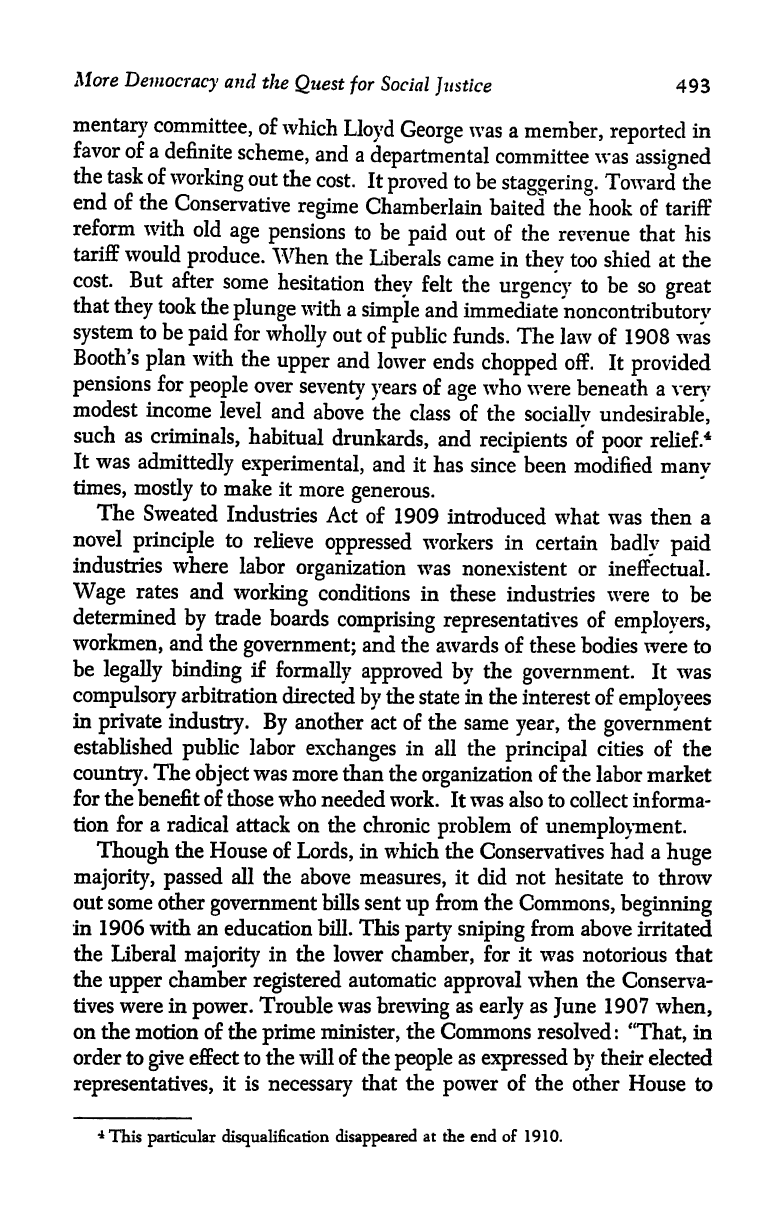
More
Democracy
and
the
Quest
for
Social
Justice
493
mentary
committee,
of
which
Lloyd
George
was a
member,
reported
in
favor
of
a
definite
scheme,
and
a
departmental
committee
was
assigned
the task
of
working
out
the
cost.
It
proved
to
be
staggering.
Toward
the
end of
the
Conservative
regime
Chamberlain
baited
the hook of tariff
reform
with
old
age
pensions
to
be
paid
out
of
the
revenue that his
tariff
would
produce.
When
the
Liberals
came
in
they
too shied
at
the
cost.
But
after
some
hesitation
they
felt
the
urgency
to be so
great
that
they
took
the
plunge
with
a
simple
and
immediate
noncontributory
system
to
be
paid
for
wholly
out
of
public
funds.
The
law of 1908
was
Booth's
plan
with
the
upper
and
lower
ends
chopped
off.
It
provided
pensions
for
people
over
seventy
years
of
age
who
were beneath a
very
modest
income
level
and
above
the
class
of the
socially
undesirable,
such
as
criminals,
habitual
drunkards,
and
recipients
of
poor
relief.
4
It was
admittedly
experimental,
and it
has
since been
modified
many
times,
mostly
to
make
it
more
generous.
The
Sweated
Industries
Act
of 1909
introduced what
was then
a
novel
principle
to
relieve
oppressed
workers
in
certain
badly paid
industries
where
labor
organization
was
nonexistent
or
ineffectual.
Wage
rates
and
working
conditions
in
these
industries
were to
be
determined
by
trade
boards
comprising
representatives
of
employers,
workmen,
and
the
government;
and
the
awards of these
bodies were
to
be
legally
binding
if
formally
approved
by
the
government.
It was
compulsory
arbitration
directed
by
the
state
in
the
interest of
employees
in
private
industry.
By
another
act
of the same
year,
the
government
established
public
labor
exchanges
in
all the
principal
cities of
the
country.
The
object
was
more than
the
organization
of the labor
market
for the
benefit
of
those
who
needed work.
It
was
also
to
collect informa-
tion
for a
radical
attack on
the
chronic
problem
of
unemployment.
Though
the
House of
Lords,
in
which
the
Conservatives
had
a
huge
majority, passed
all
the
above
measures,
it did
not hesitate
to
throw
out
some other
government
bills sent
up
from the
Commons,
beginning
in
1906 with
an
education
bill.
This
party sniping
from
above
irritated
the
Liberal
majority
in the lower
chamber,
for it
was
notorious that
the
upper
chamber
registered
automatic
approval
when
the
Conserva-
tives
were
in
power.
Trouble
was
brewing
as
early
as
June
1907
when,
on
the motion of the
prime
minister,
the Commons
resolved:
"That,
in
order
to
give
effect to the will of the
people
as
expressed by
their
elected
representatives,
it is
necessary
that
the
power
of the other
House
to
This
particular disqualification
disappeared
at
the end of
1910.
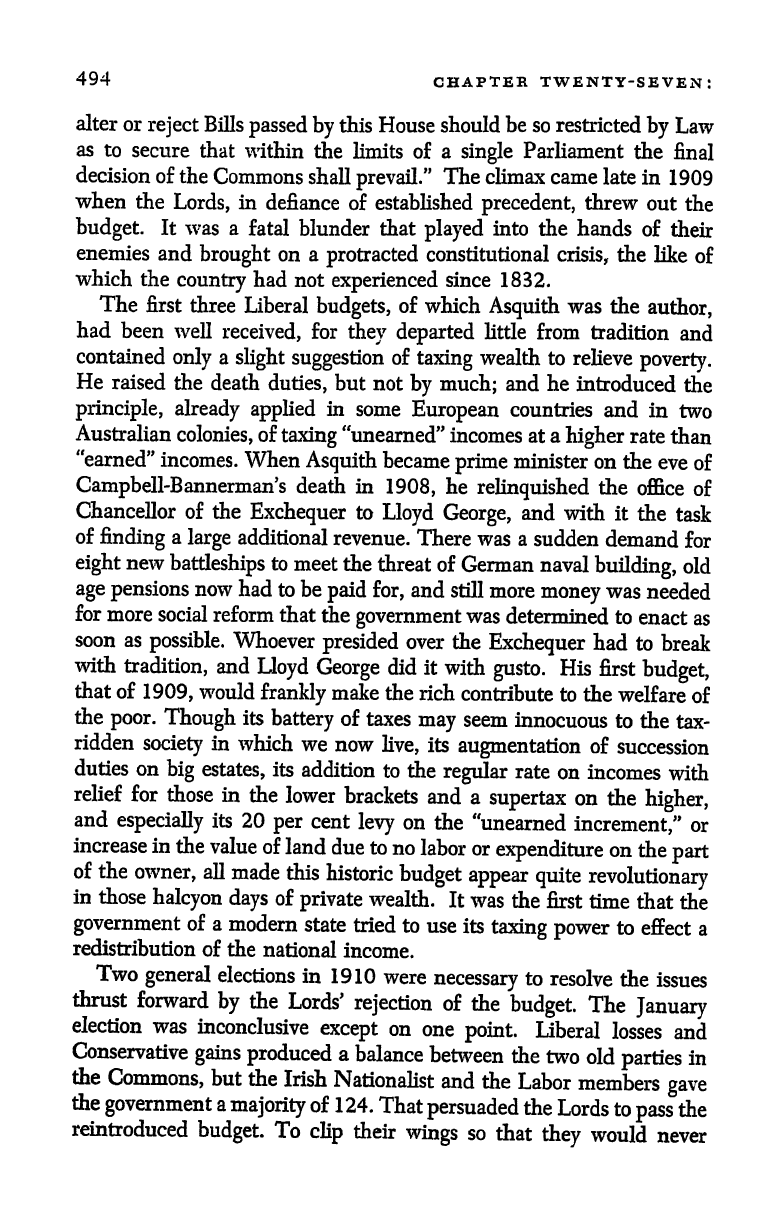
494
CHAPTER
TWENTY-SEVEN:
alter
or
reject
Bills
passed
by
this
House
should
be
so
restricted
by
Law
as
to
secure
that
within
the limits
of
a
single
Parliament
the
final
decision of
the
Commons shall
prevail."
The climax came
late
in
1909
when
the
Lords,
in
defiance of
established
precedent,
threw
out
the
budget.
It
was
a
fatal blunder
that
played
into
the
hands
of
their
enemies
and
brought
on
a
protracted
constitutional
crisis,
the
like
of
which the
country
had
not
experienced
since
1832.
The
first
three
Liberal
budgets,
of
which
Asquith
was
the
author,
had
been
well
received,
for
they
departed
little
from
tradition
and
contained
only
a
slight
suggestion
of
taxing
wealth
to relieve
poverty.
He
raised
the
death
duties,
but
not
by
much;
and he
introduced
the
principle,
already applied
in
some
European
countries
and
in
two
Australian
colonies,
of
taxing
"unearned"
incomes
at
a
higher
rate
than
"earned"
incomes.
When
Asquith
became
prime
minister
on the
eve
of
Campbell-Bannerman's
death
in
1908,
he
relinquished
the
office
of
Chancellor
of the
Exchequer
to
Lloyd
George,
and with it
the
task
of
finding
a
large
additional
revenue.
There was
a
sudden
demand
for
eight
new
battleships
to
meet
the
threat
of
German
naval
building,
old
age
pensions
now
had
to be
paid
for,
and still
more
money
was
needed
for
more
social
reform
that
the
government
was
determined to
enact
as
soon as
possible.
Whoever
presided
over
the
Exchequer
had
to
break
with
tradition,
and
Lloyd
George
did
it
with
gusto.
His
first
budget,
that
of
1909,
would
frankly
make
the
rich
contribute
to
the
welfare
of
the
poor.
Though
its
battery
of
taxes
may
seem
innocuous
to the
tax-
ridden
society
in
which
we
now
live,
its
augmentation
of
succession
duties on
big
estates,
its
addition
to the
regular
rate
on
incomes
with
relief
for
those
in
the
lower
brackets
and a
supertax
on
the
higher,
and
especially
its
20
per
cent
levy
on
the
"unearned
increment,"
or
increase
in
the
value of
land due to
no
labor
or
expenditure
on
the
part
of the
owner,
all
made
this
historic
budget
appear quite
revolutionary
in
those
halcyon
days
of
private
wealth.
It
was
the
first
time
that
the
government
of a
modern
state
tried
to
use
its
taxing
power
to
effect a
redistribution
of
the
national
income.
Two
general
elections
in
1910
were
necessary
to
resolve
the
issues
thrust
forward
by
the
Lords'
rejection
of
the
budget.
The
January
election
was
inconclusive
except
on
one
point.
Liberal
losses
and
Conservative
gains
produced
a
balance
between
the
two
old
parties
in
the
Commons,
but
the
Irish
Nationalist
and
the
Labor
members
gave
the
government
a
majority
of
124.
That
persuaded
the
Lords
to
pass
the
reintroduced
budget.
To
clip
their
wings
so
that
they
would
never
